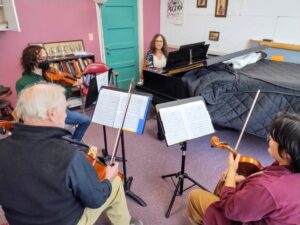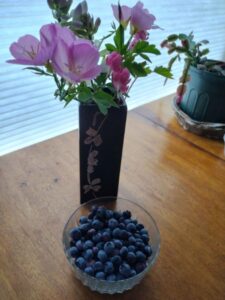My two-and-a-half-year-old grandchild, Manu, loves to play songs on the piano, which he does by pressing down on random groups of notes in the song’s rhythm. Often he sings along, eradicating any question I might have about what song he’s playing, Sometimes I sing with him, but mostly, what he wants me to do is listen–and then burst into wild applause as soon as he plays the final note.
But a few weeks ago, suddenly that wasn’t enough. He turned to me and said, “You’re supposed to say, bravo!”
“Bravo!” I willingly added.
“No!” he said. “Bra…Vo” emphasizing each syllable with equal force and leaving a breath of air in between.
“Bra…Vo!”
“No, Braah…..Vo…oh..”
“Braah….Vo..oh.”
We went through this a few times. Apparently I couldn’t say bravo exactly the way his babysitter said it, but after a while he let it go and went on to something else. Thank goodness for two-year-old attention spans.
But I’ve been thinking about the message, regardless of whether I can pronounce the word bravo to Manu’s liking. We could all use more bravo in our lives.
As some readers of this blog know, four and a half years ago I started playing the piano again after pretty much abandoning it for most of my adulthood. This required way more than beefing up my music reading and finger dexterity. It involved delving into and confronting baggage that had plagued me my entire life–my debilitating perfectionism and the resulting shame at not being able to live up to the standards enshrined in our family legacy of professional musicians.
But I slogged through, one note, one phrase, one piece at a time until I eventually got the minimal piano chops I’d had up to snuff. I only played by myself in the living room. I didn’t want a teacher, or even anyone in my family to hear me play. Yet, in the back of my mind, I wondered, was I competent enough to join a chamber group? My kids had loved doing chamber music when they were teenagers and I’d been so envious. It looked like so much fun.
 It took a year between the time I first started thinking about it before I called the local community music center and then another six months (until last February) to find a group. I’d like to say that being in this chamber music group was a sublime experience and a dream come true, but it wasn’t. On the other hand, it wasn’t awful, either. On a scale of sweet/sour, it skewed acidic, but the tangy taste was at least somewhat pleasurable. I felt gratified that I could play the music, and even if the coach seemed to give me more direction than she gave others, she always addressed me in a kind and respectful way. The other players all seemed friendly and no one stood out as being way above or below the level of the others–or unable to do what the piece demanded. But I didn’t get much of a sense of who they were as people, which I think lessened our ability to connect musically. And I didn’t particularly feel like we got into the nuances and phrasing of the piece, which made the experience rather boring (though in all fairness, maybe it was enough that we learned how to play together).
It took a year between the time I first started thinking about it before I called the local community music center and then another six months (until last February) to find a group. I’d like to say that being in this chamber music group was a sublime experience and a dream come true, but it wasn’t. On the other hand, it wasn’t awful, either. On a scale of sweet/sour, it skewed acidic, but the tangy taste was at least somewhat pleasurable. I felt gratified that I could play the music, and even if the coach seemed to give me more direction than she gave others, she always addressed me in a kind and respectful way. The other players all seemed friendly and no one stood out as being way above or below the level of the others–or unable to do what the piece demanded. But I didn’t get much of a sense of who they were as people, which I think lessened our ability to connect musically. And I didn’t particularly feel like we got into the nuances and phrasing of the piece, which made the experience rather boring (though in all fairness, maybe it was enough that we learned how to play together).
For all these reasons, and because I still am highly judgmental when it comes to music (despite how hard I try not to be), I really did not want to play at the end of semester recital. But the other musicians did, and I certainly wasn’t going to sabotage them–even though I told my partner and my daughter very definitively that no, I did NOT want them to come.
So, last Sunday I sucked it up and drove through the foggy, drizzly rain to the performance venue, arriving half an hour early so we could get in one last run through. I noticed that without depending on the coach to tell us what to do that we were able to stop ourselves to talk about problem spots and address them, and this made me feel more connected to the other musicians. And I was pleased that our actual performance of the piece, while not perfect or wonderful or exciting, was better than we usually played it, despite the nerves of having to play in front of an audience.
No one said, bravo, or (bra… vo…) but that’s okay. I can say bravo to myself for my bravery.
Subscribe at https://ddinafriedman.substack.com









